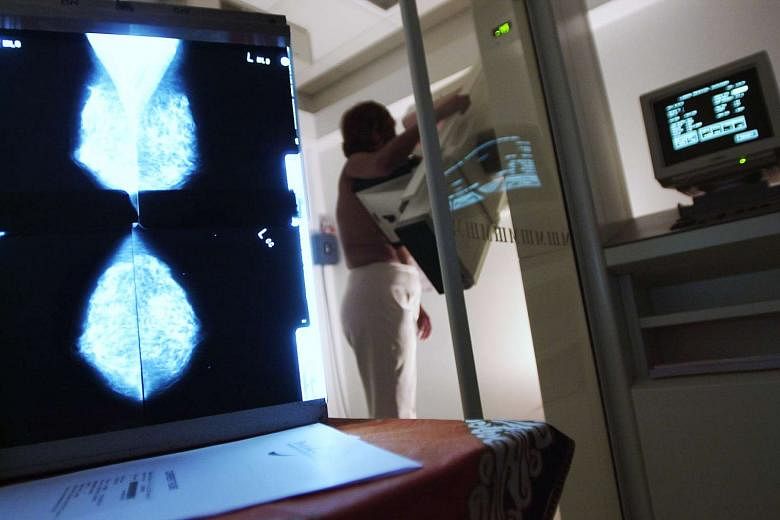Extracting tumour cells and DNA to track how the cancer is progressing in a patient will soon be as simple as doing it via a blood test, instead of the traditional biopsy.
This new method, known as liquid biopsy, is less painful, cheaper and has none of the complications that a tissue biopsy could result in. It is already being explored by the international medical community.
Tissue biopsy typically involves drawing cancer cells or tissue straight from the tumour, and side effects could include infections. Liquid biopsy, in contrast, is as simple as drawing blood.
The new method could be offered as an option to cancer patients in Singapore as early as this year, said the National Cancer Centre Singapore (NCCS) and the Agency for Science, Technology and Research (A*Star), which have been working on studies involving patients here in the past year.
Dr Daniel Tan, director of the Experimental Cancer Treatment Unit at the NCCS, said it started trying out liquid biopsy on cancer patients in the past five months, as part of a trial.
-
Tissue biopsy v liquid biopsy
-
TISSUE BIOPSY
1. A needle is inserted through the healthy part of the lung to extract a sample from the tumour.
2. The tumour tissue is sent to the laboratory for analysis.
3. Analysis is done through a process called next-generation sequencing, where doctors find out everything about the tumour, including tumour DNA, and any mutations.
4. Results are back within a few days to weeks.
LIQUID BIOPSY
1. Blood is taken from the patient, via any part of the body.
2. Tumour cells in the blood can be analysed through two ways:
• Isolating the circulating tumour cells that are sieved out via a method called the molecular sieve.
• Analysing the circulating tumour DNA in the blood, without the need to sieve. This is done for the most advanced cancers as the yield of tumour DNA in the blood is already very high.
3. Analysing the tumour DNA is done through a probe. This works by creating an artificial piece of gene which will "call out" to, or draw the cancer gene in the blood that doctors are looking for, in a process called polymerase chain reaction.
4. Results are back within a few days to weeks.
"We hope to be able to introduce such a test as soon as possible, but it is absolutely critical to establish the performance of these tests prior to routine clinical use," he said, referring to their accuracy.
Dr Wong Seng Weng, medical director and consultant medical oncologist at The Cancer Centre, is currently on a study with A*Star involving liquid biopsies for lung cancer.
"The challenge is that cancer cells will change, as treatment progresses. So we would need to collect more tumour specimens to see how the cancer has changed, as maybe the treatment no longer works," said Dr Wong. With liquid biopsy, doctors can tailor the treatment, and pick a drug according to how the cancer has mutated.
Dr Min-Han Tan from A*Star added: "Sometimes, when using tissue biopsies, doctors are working on outdated intelligence. We get real-time intelligence with blood tests."
Liquid biopsies are also cheaper. Although it is not offered here yet, those done overseas costs between US$500 (S$686) and US$1,000, while tissue biopsies done here cost up to $5,000, said Dr Wong.
Multiple tissue biopsies are more risky for certain cancers, such as lung cancer. Risks are high, including partial lung collapse and bleeding.
Liquid biopsy is thus good for lung or colorectal cancer. It allows doctors to get information via blood tests repeatedly as there are less complications than tissue biopsy, which is more invasive, Dr Wong said.
"(Liquid biopsies) are especially useful in certain cancers such as lung cancer, where biopsies typically yield scanty amount of tissue. Furthermore, a majority of patients still present at late stage, where circulating free DNA can be more readily detected (in the blood test)," added NCCS' Dr Tan.
Now, the question is how accurate the blood tests are, as compared to tissue biopsies. So far, the NCCS tests have shown that the sensitivity is as high as 90 per cent. But Dr Tan believes that eventually higher accuracy can be attained as technology and computational algorithms improve.
"The performance of such tests... can be influenced by a range of factors including cancer type, stage of cancer, how the blood is collected and stored. Until we understand how they affect the final results, liquid biopsies should not replace tissue biopsies just yet."
For instance, there is less circulating DNA in the blood at the early stages of cancer, so liquid biopsy administered at these stages would yield less accurate results. Tissue biopsy would be more effective in such cases.
The latest cancer report released by the National Registry of Diseases Office shows that more people are dying of cancer, with some 1,800 more people diagnosed with cancer in 2014 than four years ago.
There were 13,241 cases in 2014 and the registry estimates that one in four men and one in five women in Singapore are likely to get cancer by the time they are 75 years old.

